Argumentative Essay: Technology's Benevolent Impact on Humanity
VerifiedAdded on 2022/08/24
|6
|1682
|14
Essay
AI Summary
This argumentative essay explores the inherent goodness of technology and its positive impact on society and humanity, while acknowledging the potential for misuse. The essay presents arguments focusing on how technology reduces labor, constructs civilization, and advances medical and healthcare capabilities. It counters arguments rooted in pre-enlightenment moral accounts and the fear of the unknown, referencing philosophers like Kant and Mitcham to highlight the importance of moral development and regulations in controlling the misappropriation of technology. The essay provides examples of how technology has improved society and its impact on various aspects of human life. The essay concludes that the benefits of technology outweigh the negative consequences, which can be mitigated through responsible use and ethical decision-making.
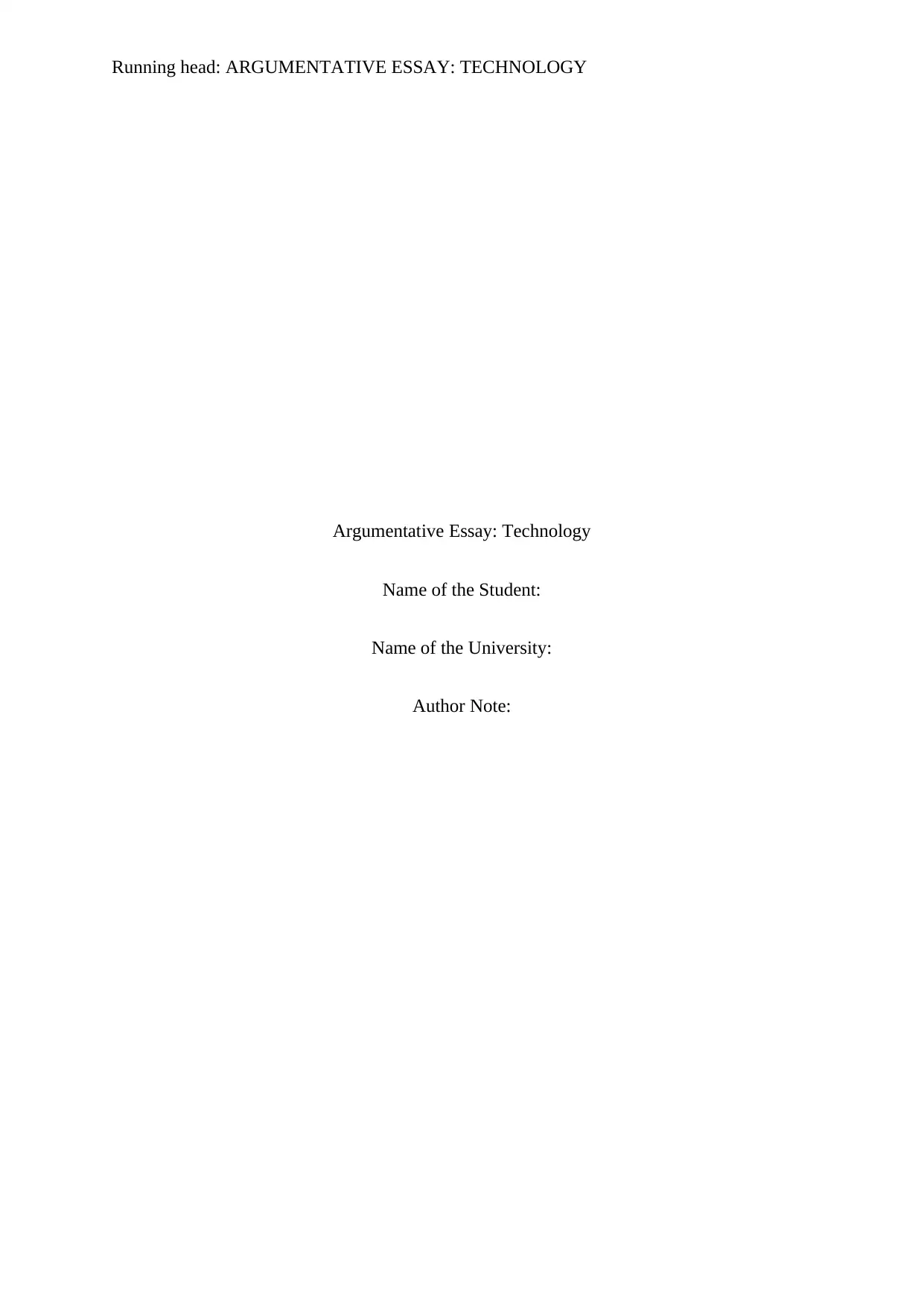
Running head: ARGUMENTATIVE ESSAY: TECHNOLOGY
Argumentative Essay: Technology
Name of the Student:
Name of the University:
Author Note:
Argumentative Essay: Technology
Name of the Student:
Name of the University:
Author Note:
Paraphrase This Document
Need a fresh take? Get an instant paraphrase of this document with our AI Paraphraser
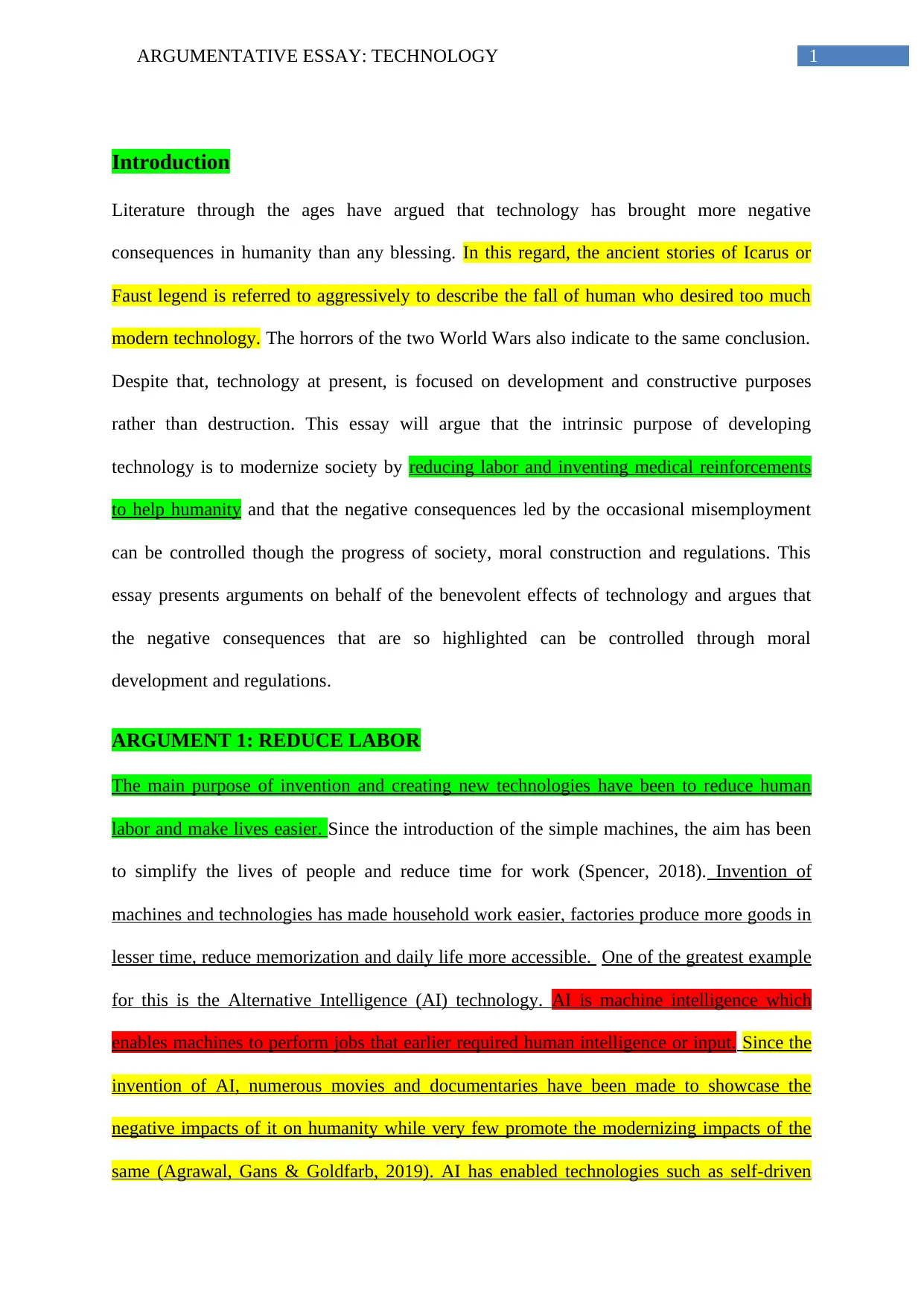
1ARGUMENTATIVE ESSAY: TECHNOLOGY
Introduction
Literature through the ages have argued that technology has brought more negative
consequences in humanity than any blessing. In this regard, the ancient stories of Icarus or
Faust legend is referred to aggressively to describe the fall of human who desired too much
modern technology. The horrors of the two World Wars also indicate to the same conclusion.
Despite that, technology at present, is focused on development and constructive purposes
rather than destruction. This essay will argue that the intrinsic purpose of developing
technology is to modernize society by reducing labor and inventing medical reinforcements
to help humanity and that the negative consequences led by the occasional misemployment
can be controlled though the progress of society, moral construction and regulations. This
essay presents arguments on behalf of the benevolent effects of technology and argues that
the negative consequences that are so highlighted can be controlled through moral
development and regulations.
ARGUMENT 1: REDUCE LABOR
The main purpose of invention and creating new technologies have been to reduce human
labor and make lives easier. Since the introduction of the simple machines, the aim has been
to simplify the lives of people and reduce time for work (Spencer, 2018). Invention of
machines and technologies has made household work easier, factories produce more goods in
lesser time, reduce memorization and daily life more accessible. One of the greatest example
for this is the Alternative Intelligence (AI) technology. AI is machine intelligence which
enables machines to perform jobs that earlier required human intelligence or input. Since the
invention of AI, numerous movies and documentaries have been made to showcase the
negative impacts of it on humanity while very few promote the modernizing impacts of the
same (Agrawal, Gans & Goldfarb, 2019). AI has enabled technologies such as self-driven
Introduction
Literature through the ages have argued that technology has brought more negative
consequences in humanity than any blessing. In this regard, the ancient stories of Icarus or
Faust legend is referred to aggressively to describe the fall of human who desired too much
modern technology. The horrors of the two World Wars also indicate to the same conclusion.
Despite that, technology at present, is focused on development and constructive purposes
rather than destruction. This essay will argue that the intrinsic purpose of developing
technology is to modernize society by reducing labor and inventing medical reinforcements
to help humanity and that the negative consequences led by the occasional misemployment
can be controlled though the progress of society, moral construction and regulations. This
essay presents arguments on behalf of the benevolent effects of technology and argues that
the negative consequences that are so highlighted can be controlled through moral
development and regulations.
ARGUMENT 1: REDUCE LABOR
The main purpose of invention and creating new technologies have been to reduce human
labor and make lives easier. Since the introduction of the simple machines, the aim has been
to simplify the lives of people and reduce time for work (Spencer, 2018). Invention of
machines and technologies has made household work easier, factories produce more goods in
lesser time, reduce memorization and daily life more accessible. One of the greatest example
for this is the Alternative Intelligence (AI) technology. AI is machine intelligence which
enables machines to perform jobs that earlier required human intelligence or input. Since the
invention of AI, numerous movies and documentaries have been made to showcase the
negative impacts of it on humanity while very few promote the modernizing impacts of the
same (Agrawal, Gans & Goldfarb, 2019). AI has enabled technologies such as self-driven
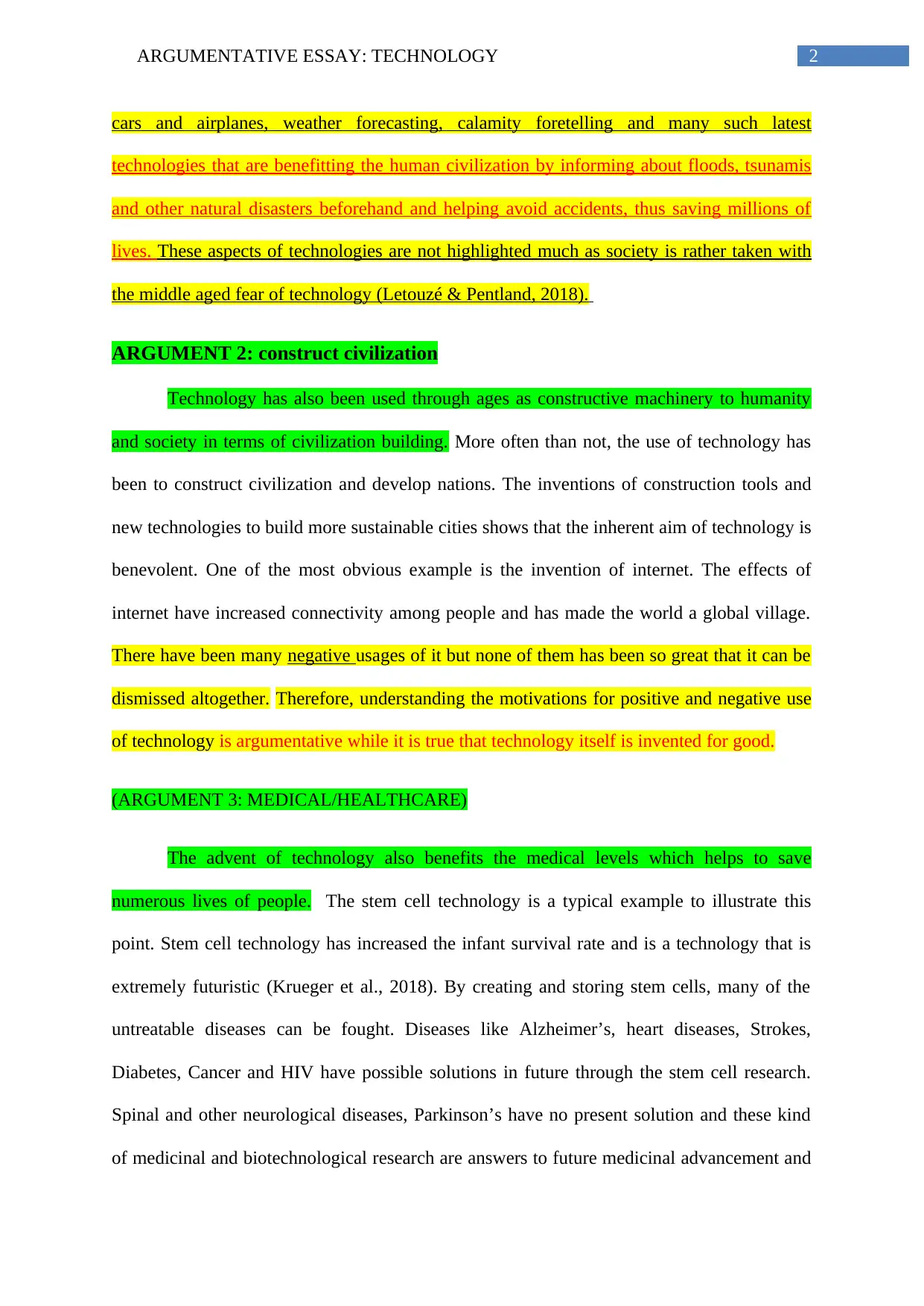
2ARGUMENTATIVE ESSAY: TECHNOLOGY
cars and airplanes, weather forecasting, calamity foretelling and many such latest
technologies that are benefitting the human civilization by informing about floods, tsunamis
and other natural disasters beforehand and helping avoid accidents, thus saving millions of
lives. These aspects of technologies are not highlighted much as society is rather taken with
the middle aged fear of technology (Letouzé & Pentland, 2018).
ARGUMENT 2: construct civilization
Technology has also been used through ages as constructive machinery to humanity
and society in terms of civilization building. More often than not, the use of technology has
been to construct civilization and develop nations. The inventions of construction tools and
new technologies to build more sustainable cities shows that the inherent aim of technology is
benevolent. One of the most obvious example is the invention of internet. The effects of
internet have increased connectivity among people and has made the world a global village.
There have been many negative usages of it but none of them has been so great that it can be
dismissed altogether. Therefore, understanding the motivations for positive and negative use
of technology is argumentative while it is true that technology itself is invented for good.
(ARGUMENT 3: MEDICAL/HEALTHCARE)
The advent of technology also benefits the medical levels which helps to save
numerous lives of people. The stem cell technology is a typical example to illustrate this
point. Stem cell technology has increased the infant survival rate and is a technology that is
extremely futuristic (Krueger et al., 2018). By creating and storing stem cells, many of the
untreatable diseases can be fought. Diseases like Alzheimer’s, heart diseases, Strokes,
Diabetes, Cancer and HIV have possible solutions in future through the stem cell research.
Spinal and other neurological diseases, Parkinson’s have no present solution and these kind
of medicinal and biotechnological research are answers to future medicinal advancement and
cars and airplanes, weather forecasting, calamity foretelling and many such latest
technologies that are benefitting the human civilization by informing about floods, tsunamis
and other natural disasters beforehand and helping avoid accidents, thus saving millions of
lives. These aspects of technologies are not highlighted much as society is rather taken with
the middle aged fear of technology (Letouzé & Pentland, 2018).
ARGUMENT 2: construct civilization
Technology has also been used through ages as constructive machinery to humanity
and society in terms of civilization building. More often than not, the use of technology has
been to construct civilization and develop nations. The inventions of construction tools and
new technologies to build more sustainable cities shows that the inherent aim of technology is
benevolent. One of the most obvious example is the invention of internet. The effects of
internet have increased connectivity among people and has made the world a global village.
There have been many negative usages of it but none of them has been so great that it can be
dismissed altogether. Therefore, understanding the motivations for positive and negative use
of technology is argumentative while it is true that technology itself is invented for good.
(ARGUMENT 3: MEDICAL/HEALTHCARE)
The advent of technology also benefits the medical levels which helps to save
numerous lives of people. The stem cell technology is a typical example to illustrate this
point. Stem cell technology has increased the infant survival rate and is a technology that is
extremely futuristic (Krueger et al., 2018). By creating and storing stem cells, many of the
untreatable diseases can be fought. Diseases like Alzheimer’s, heart diseases, Strokes,
Diabetes, Cancer and HIV have possible solutions in future through the stem cell research.
Spinal and other neurological diseases, Parkinson’s have no present solution and these kind
of medicinal and biotechnological research are answers to future medicinal advancement and
⊘ This is a preview!⊘
Do you want full access?
Subscribe today to unlock all pages.

Trusted by 1+ million students worldwide
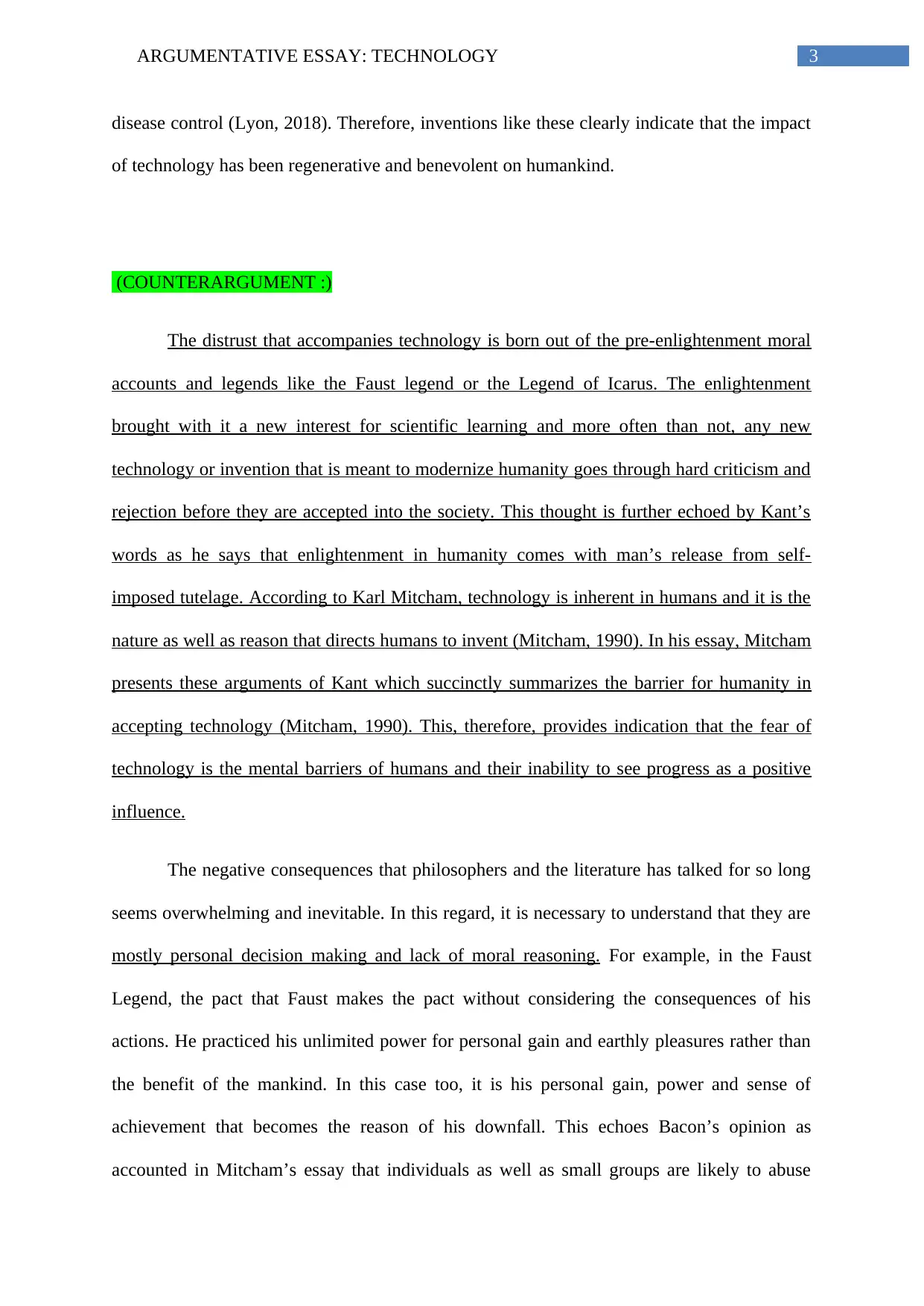
3ARGUMENTATIVE ESSAY: TECHNOLOGY
disease control (Lyon, 2018). Therefore, inventions like these clearly indicate that the impact
of technology has been regenerative and benevolent on humankind.
(COUNTERARGUMENT :)
The distrust that accompanies technology is born out of the pre-enlightenment moral
accounts and legends like the Faust legend or the Legend of Icarus. The enlightenment
brought with it a new interest for scientific learning and more often than not, any new
technology or invention that is meant to modernize humanity goes through hard criticism and
rejection before they are accepted into the society. This thought is further echoed by Kant’s
words as he says that enlightenment in humanity comes with man’s release from self-
imposed tutelage. According to Karl Mitcham, technology is inherent in humans and it is the
nature as well as reason that directs humans to invent (Mitcham, 1990). In his essay, Mitcham
presents these arguments of Kant which succinctly summarizes the barrier for humanity in
accepting technology (Mitcham, 1990). This, therefore, provides indication that the fear of
technology is the mental barriers of humans and their inability to see progress as a positive
influence.
The negative consequences that philosophers and the literature has talked for so long
seems overwhelming and inevitable. In this regard, it is necessary to understand that they are
mostly personal decision making and lack of moral reasoning. For example, in the Faust
Legend, the pact that Faust makes the pact without considering the consequences of his
actions. He practiced his unlimited power for personal gain and earthly pleasures rather than
the benefit of the mankind. In this case too, it is his personal gain, power and sense of
achievement that becomes the reason of his downfall. This echoes Bacon’s opinion as
accounted in Mitcham’s essay that individuals as well as small groups are likely to abuse
disease control (Lyon, 2018). Therefore, inventions like these clearly indicate that the impact
of technology has been regenerative and benevolent on humankind.
(COUNTERARGUMENT :)
The distrust that accompanies technology is born out of the pre-enlightenment moral
accounts and legends like the Faust legend or the Legend of Icarus. The enlightenment
brought with it a new interest for scientific learning and more often than not, any new
technology or invention that is meant to modernize humanity goes through hard criticism and
rejection before they are accepted into the society. This thought is further echoed by Kant’s
words as he says that enlightenment in humanity comes with man’s release from self-
imposed tutelage. According to Karl Mitcham, technology is inherent in humans and it is the
nature as well as reason that directs humans to invent (Mitcham, 1990). In his essay, Mitcham
presents these arguments of Kant which succinctly summarizes the barrier for humanity in
accepting technology (Mitcham, 1990). This, therefore, provides indication that the fear of
technology is the mental barriers of humans and their inability to see progress as a positive
influence.
The negative consequences that philosophers and the literature has talked for so long
seems overwhelming and inevitable. In this regard, it is necessary to understand that they are
mostly personal decision making and lack of moral reasoning. For example, in the Faust
Legend, the pact that Faust makes the pact without considering the consequences of his
actions. He practiced his unlimited power for personal gain and earthly pleasures rather than
the benefit of the mankind. In this case too, it is his personal gain, power and sense of
achievement that becomes the reason of his downfall. This echoes Bacon’s opinion as
accounted in Mitcham’s essay that individuals as well as small groups are likely to abuse
Paraphrase This Document
Need a fresh take? Get an instant paraphrase of this document with our AI Paraphraser
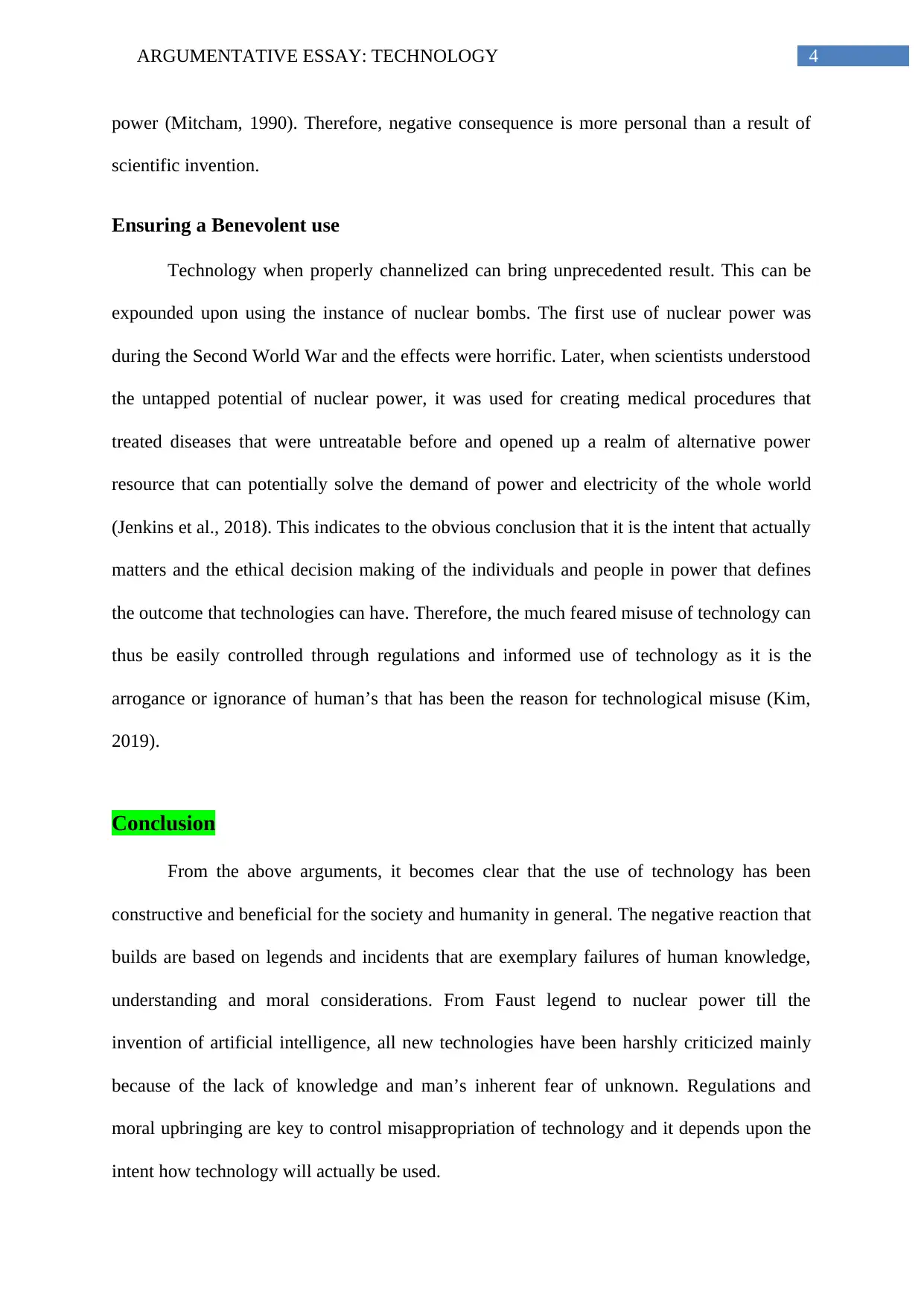
4ARGUMENTATIVE ESSAY: TECHNOLOGY
power (Mitcham, 1990). Therefore, negative consequence is more personal than a result of
scientific invention.
Ensuring a Benevolent use
Technology when properly channelized can bring unprecedented result. This can be
expounded upon using the instance of nuclear bombs. The first use of nuclear power was
during the Second World War and the effects were horrific. Later, when scientists understood
the untapped potential of nuclear power, it was used for creating medical procedures that
treated diseases that were untreatable before and opened up a realm of alternative power
resource that can potentially solve the demand of power and electricity of the whole world
(Jenkins et al., 2018). This indicates to the obvious conclusion that it is the intent that actually
matters and the ethical decision making of the individuals and people in power that defines
the outcome that technologies can have. Therefore, the much feared misuse of technology can
thus be easily controlled through regulations and informed use of technology as it is the
arrogance or ignorance of human’s that has been the reason for technological misuse (Kim,
2019).
Conclusion
From the above arguments, it becomes clear that the use of technology has been
constructive and beneficial for the society and humanity in general. The negative reaction that
builds are based on legends and incidents that are exemplary failures of human knowledge,
understanding and moral considerations. From Faust legend to nuclear power till the
invention of artificial intelligence, all new technologies have been harshly criticized mainly
because of the lack of knowledge and man’s inherent fear of unknown. Regulations and
moral upbringing are key to control misappropriation of technology and it depends upon the
intent how technology will actually be used.
power (Mitcham, 1990). Therefore, negative consequence is more personal than a result of
scientific invention.
Ensuring a Benevolent use
Technology when properly channelized can bring unprecedented result. This can be
expounded upon using the instance of nuclear bombs. The first use of nuclear power was
during the Second World War and the effects were horrific. Later, when scientists understood
the untapped potential of nuclear power, it was used for creating medical procedures that
treated diseases that were untreatable before and opened up a realm of alternative power
resource that can potentially solve the demand of power and electricity of the whole world
(Jenkins et al., 2018). This indicates to the obvious conclusion that it is the intent that actually
matters and the ethical decision making of the individuals and people in power that defines
the outcome that technologies can have. Therefore, the much feared misuse of technology can
thus be easily controlled through regulations and informed use of technology as it is the
arrogance or ignorance of human’s that has been the reason for technological misuse (Kim,
2019).
Conclusion
From the above arguments, it becomes clear that the use of technology has been
constructive and beneficial for the society and humanity in general. The negative reaction that
builds are based on legends and incidents that are exemplary failures of human knowledge,
understanding and moral considerations. From Faust legend to nuclear power till the
invention of artificial intelligence, all new technologies have been harshly criticized mainly
because of the lack of knowledge and man’s inherent fear of unknown. Regulations and
moral upbringing are key to control misappropriation of technology and it depends upon the
intent how technology will actually be used.
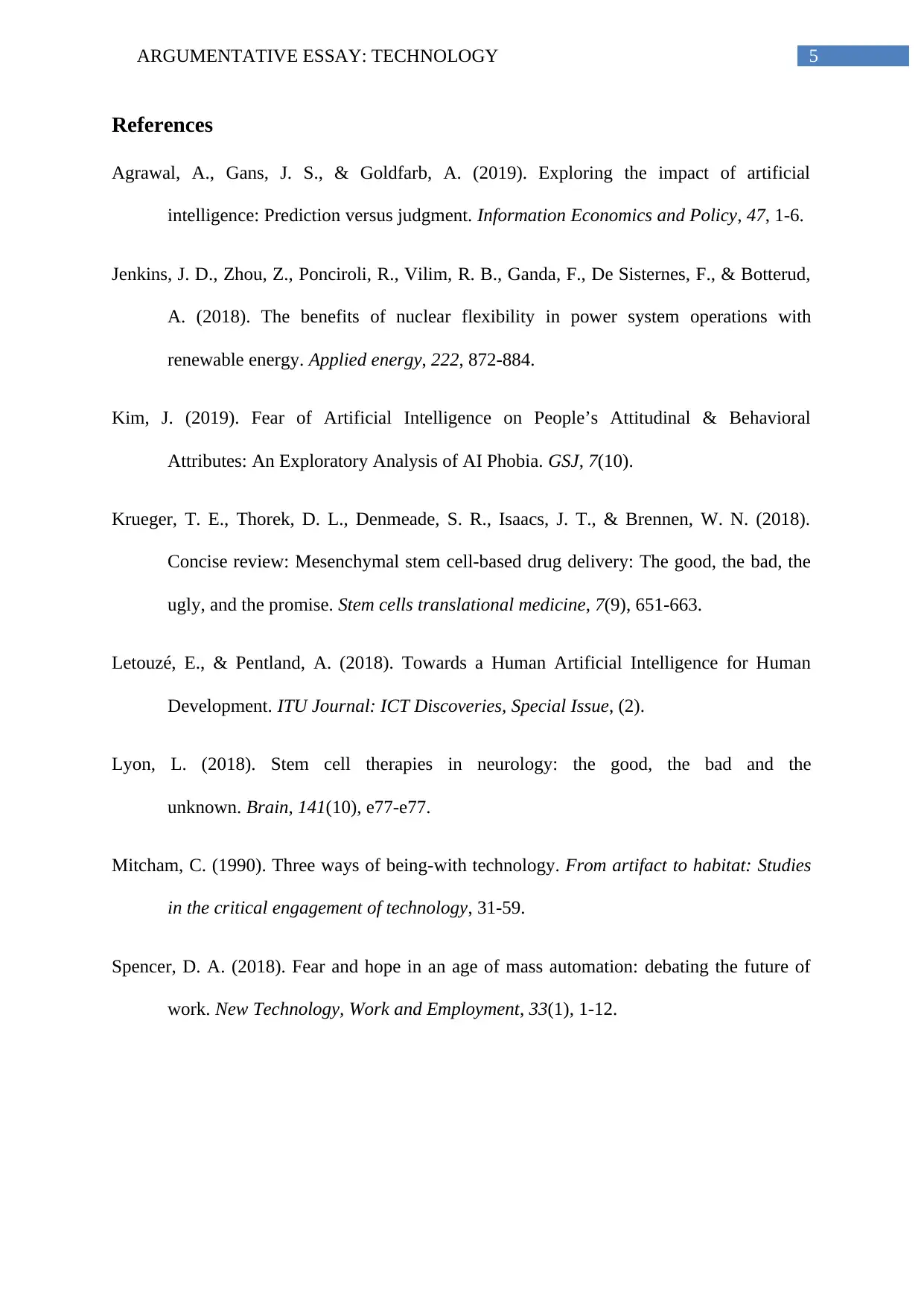
5ARGUMENTATIVE ESSAY: TECHNOLOGY
References
Agrawal, A., Gans, J. S., & Goldfarb, A. (2019). Exploring the impact of artificial
intelligence: Prediction versus judgment. Information Economics and Policy, 47, 1-6.
Jenkins, J. D., Zhou, Z., Ponciroli, R., Vilim, R. B., Ganda, F., De Sisternes, F., & Botterud,
A. (2018). The benefits of nuclear flexibility in power system operations with
renewable energy. Applied energy, 222, 872-884.
Kim, J. (2019). Fear of Artificial Intelligence on People’s Attitudinal & Behavioral
Attributes: An Exploratory Analysis of AI Phobia. GSJ, 7(10).
Krueger, T. E., Thorek, D. L., Denmeade, S. R., Isaacs, J. T., & Brennen, W. N. (2018).
Concise review: Mesenchymal stem cell‐based drug delivery: The good, the bad, the
ugly, and the promise. Stem cells translational medicine, 7(9), 651-663.
Letouzé, E., & Pentland, A. (2018). Towards a Human Artificial Intelligence for Human
Development. ITU Journal: ICT Discoveries, Special Issue, (2).
Lyon, L. (2018). Stem cell therapies in neurology: the good, the bad and the
unknown. Brain, 141(10), e77-e77.
Mitcham, C. (1990). Three ways of being-with technology. From artifact to habitat: Studies
in the critical engagement of technology, 31-59.
Spencer, D. A. (2018). Fear and hope in an age of mass automation: debating the future of
work. New Technology, Work and Employment, 33(1), 1-12.
References
Agrawal, A., Gans, J. S., & Goldfarb, A. (2019). Exploring the impact of artificial
intelligence: Prediction versus judgment. Information Economics and Policy, 47, 1-6.
Jenkins, J. D., Zhou, Z., Ponciroli, R., Vilim, R. B., Ganda, F., De Sisternes, F., & Botterud,
A. (2018). The benefits of nuclear flexibility in power system operations with
renewable energy. Applied energy, 222, 872-884.
Kim, J. (2019). Fear of Artificial Intelligence on People’s Attitudinal & Behavioral
Attributes: An Exploratory Analysis of AI Phobia. GSJ, 7(10).
Krueger, T. E., Thorek, D. L., Denmeade, S. R., Isaacs, J. T., & Brennen, W. N. (2018).
Concise review: Mesenchymal stem cell‐based drug delivery: The good, the bad, the
ugly, and the promise. Stem cells translational medicine, 7(9), 651-663.
Letouzé, E., & Pentland, A. (2018). Towards a Human Artificial Intelligence for Human
Development. ITU Journal: ICT Discoveries, Special Issue, (2).
Lyon, L. (2018). Stem cell therapies in neurology: the good, the bad and the
unknown. Brain, 141(10), e77-e77.
Mitcham, C. (1990). Three ways of being-with technology. From artifact to habitat: Studies
in the critical engagement of technology, 31-59.
Spencer, D. A. (2018). Fear and hope in an age of mass automation: debating the future of
work. New Technology, Work and Employment, 33(1), 1-12.
⊘ This is a preview!⊘
Do you want full access?
Subscribe today to unlock all pages.

Trusted by 1+ million students worldwide
1 out of 6
Related Documents
Your All-in-One AI-Powered Toolkit for Academic Success.
+13062052269
info@desklib.com
Available 24*7 on WhatsApp / Email
![[object Object]](/_next/static/media/star-bottom.7253800d.svg)
Unlock your academic potential
Copyright © 2020–2026 A2Z Services. All Rights Reserved. Developed and managed by ZUCOL.




